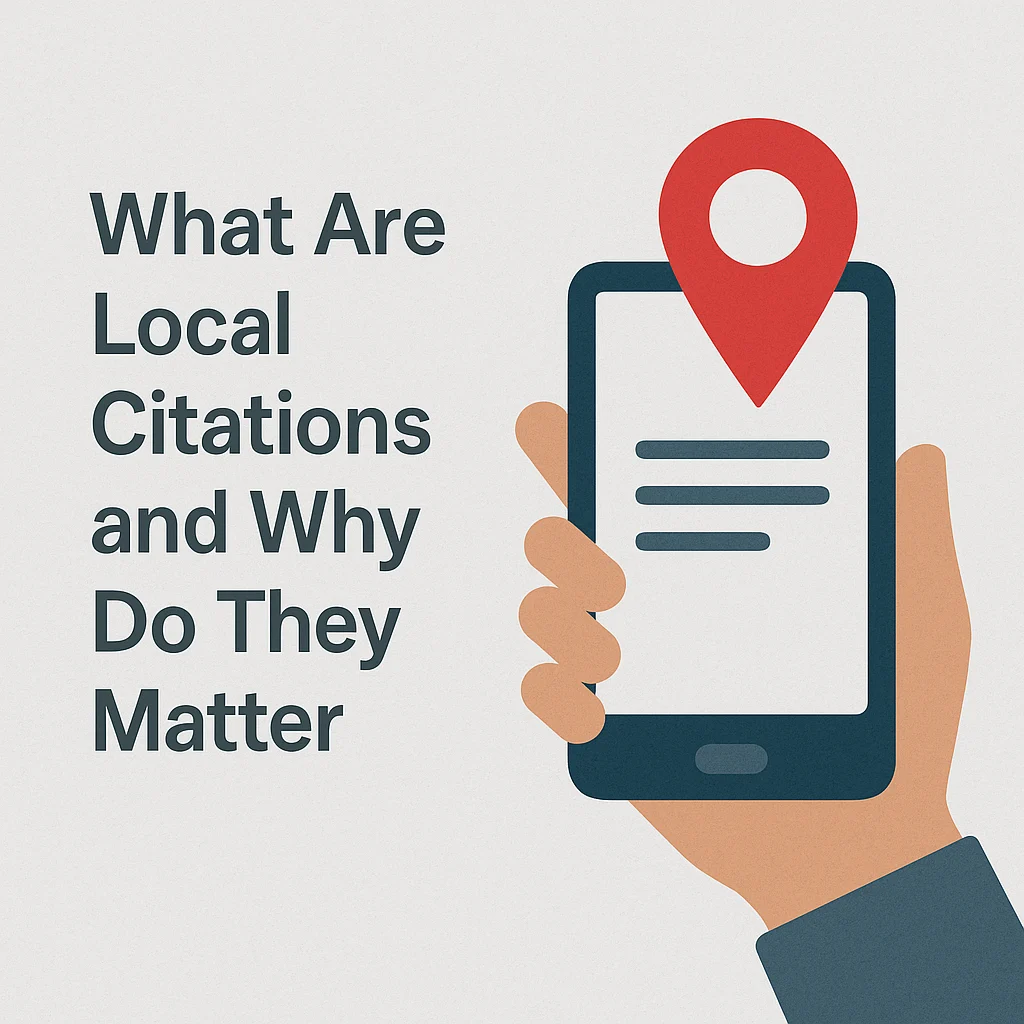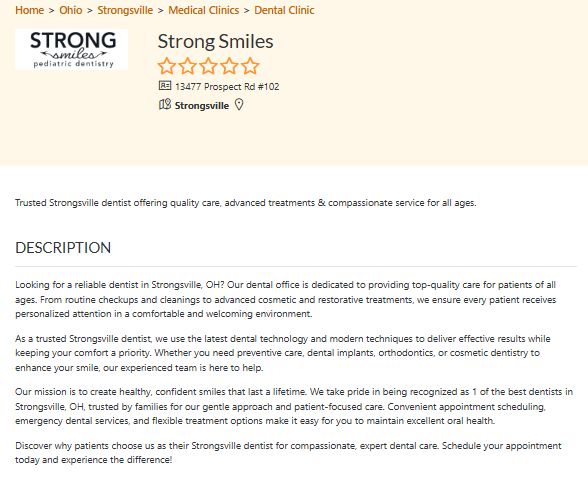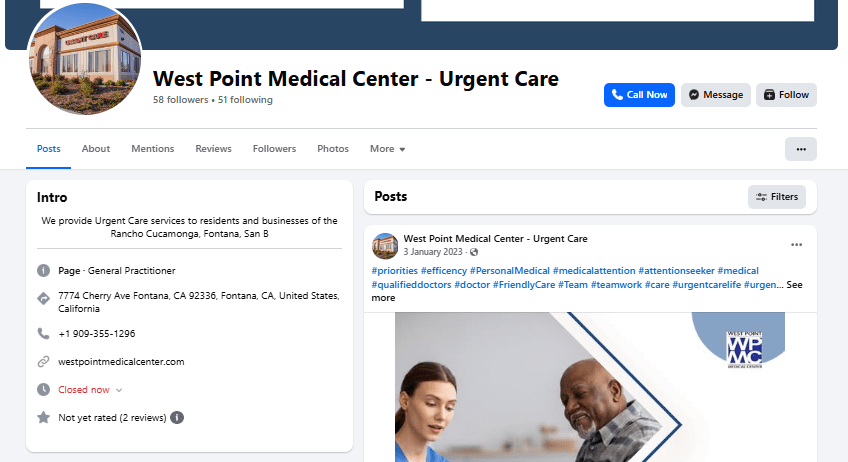
Limited time offer – Zero commission on Google Ads
You only pay what you spend on your Google Ads, no commission or hidden charges
So, if you’ve ever tried juggling your dental practice’s online presence across Google, Yelp, Yellow Pages, and a dozen other directories, you know the struggle. One listing has the wrong phone number, another shows an outdated address, and patients are getting confused—or worse, going to a competitor.
Now pause, take a deep breath, and imagine having a system where every mention of your business across the web is accurate, consistent, and trusted by Google—helping your practice show up when local patients are searching for precisely what you offer.
That’s the power of local citations. Not some SEO gimmick, definitely not a “set it and forget it” tactic, but a foundational, trust-building element that, when done right, can dramatically boost your local search visibility and drive real patients to your door.
This guide isn’t another vague “local SEO is important” post. It’s a practical, expert-driven breakdown of what local citations are, why they matter for your practice, and how to make them work effectively for your local growth.
Are you ready? Let’s jump in!
Sometimes, even when your dental practice has a website, a Google Business Profile, and a few directory listings, your practice still isn’t showing up prominently in local searches. That’s what local search citations are all about. They’re the online mentions of your practice’s name, address, and phone number (commonly called NAP) on websites that aren’t your own.
If these local citations are inconsistent, outdated, or missing from important directories, it can cost you a position in the Google 3-Pack. Due to these inconsistencies, Google may also display conflicting information when you search for your practice or services.
And let’s be honest—that’s a really big problem, mainly if your practice relies on local search to attract new patients and maintain its visibility. It’s like giving directions that keep changing—patients may never find you.
Now, let’s discuss why local search citations matter and how they can directly impact your practice’s visibility in local searches.
Local citations act as trust signals for search engines, proving your business is real, relevant, and locally established. Especially when your practice is starting out, you need citations in order to secure your position in the Google Local 3 pack. Let’s uncover why these consistent mentions of your practice matter.
Improve Local Rankings
How do local citations help SEO? When your practice is consistently listed in trusted online directories, it sends strong signals to Google that your business is credible. As a result, they serve as a pivotal ranking factor in local SEO for doctors while also validating that your practice is located precisely where you’ve mentioned across all platforms.
The number of citations you have, their accuracy, and the quality of the directories all influence how Google perceives your digital presence. This is why keeping your citations consistent and choosing the relevant platforms is quite essential.
Gain Visibility in Competitive Searches
Another overlooked benefit of citations is that many online directories, like Zocdoc, Healthgrades, Yelp, and YellowPages, often dominate page one of Google search results. So if you can’t outrank them, leverage them! Getting listed on these directories gives your practice another way to appear on page one and capture patient attention. This approach is also reinforced by broader local SEO strategies for dentists that prioritize visibility in competitive local searches.
Drive Referral Traffic
Not every patient starts their search on Google. Many of them prefer to move on to platforms like Healthgrades or Zocdoc when searching for a new doctor or dentist. These users may check directories first before ever turning to Google. By ensuring your practice is listed there in as many relevant directories as possible, you open the door to steady referral traffic from platforms patients already trust. This can work hand in hand with strategies like hyperlocal SEO that drive neighborhood-level visibility.
Not every citation source will be relevant for your healthcare practice, and you don’t need to be listed everywhere. That’s why choosing the right citation types wisely is crucial for building authority and improving local search visibility.
They are categorized into structured (formal listings in directories with standardized fields) and unstructured (informal mentions, like in blog posts or articles). Below, we'll outline the main types, with examples tailored to healthcare. Ensure you Prioritize high-authority, healthcare-specific sites for maximum impact and maintain NAP consistency across all. This way you can easily avoid penalties from search engines.

These are broad platforms where any local business, including healthcare practices, can list. They form the foundation of local citations and often possess high domain authority, which significantly influences SEO outcomes.
Examples:
- Google Business Profile (formerly known as Google My Business): This is Essential for appearing in Google Maps and local pack results.
- Yelp: Popular for reviews; healthcare practices can claim profiles to manage patient feedback.
- Yellow Pages (YP.com): A classic directory for basic NAP listings.
- Bing Places and Apple Maps: For cross-platform visibility.
Patients often start searches here, and these sites drive foot traffic to your practices.

These are niche platforms focused on medical professionals that offer detailed listings like specialties, credentials, and services. They carry more weight for healthcare Local SEO due to relevance and trust signals. These build credibility in the medical field and target health-conscious searchers.
Examples:
- Healthgrades: A leading site for doctor and practice reviews; includes patient ratings and specialties.
- Vitals: Focuses on physicians and clinics, with tools for appointment booking.
- Zocdoc: A booking platform where practices can list availability and services.
- WebMD Physician Directory: Connects practices with patients seeking specific care.
- RateMDs or CareDash: User-review sites for doctors and facilities.
- American Medical Association (AMA) Directory: Professional listing for verified physicians.

These focus on city- or state-specific listings, ideal for community-based healthcare practices. They help with hyper-local SEO.
Examples:
- Local Chamber of Commerce websites (e.g., city-specific chambers).
- Craigslist (local classifieds section).
- Angie’s List (now part of Angi): For service-based healthcare like home care.
- State medical boards or health department directories (e.g., California Department of Public Health listings).
They emphasize proximity and help practices to appear in searches tied to specific locales.
Listings on medical associations or networking sites that verify credentials and provide citations.
Examples:
- American Dental Association (ADA) for dentists.
- American Academy of Pediatrics (AAP) for pediatric practices.
- LinkedIn Company Pages: For professional networking and basic NAP.
- Doximity: A network for healthcare professionals with public profiles.
These are trusted Listings that add authority through professional validation, signaling expertise to search engines.

Profiles on social sites count as citations if they include NAP and are claimed/verified.
Examples:
- Facebook Business Pages: Known for high engagement and patient interaction.
- Twitter (X) or Instagram Business Profiles: For sharing health tips and listings.
- Nextdoor: Neighborhood-focused for local healthcare recommendations.
Patients trust peer reviews here, and active profiles can generate unstructured citations via shares.
These are non-directory mentions, often from earned media, but can be encouraged through outreach.
Examples:
- Local news articles or healthcare blogs mentioning the practice.
- Partner websites (e.g., insurance providers like Blue Cross Blue Shield directories).
- Event listings on community calendars (e.g., health fairs).
They provide natural backlinks and contextual relevance, enhancing overall online reputation.
Managing and optimizing citations is just as important as creating them. Here, we’ve listed some proven strategies that dental practices can follow to manage local citations effectively and strengthen local SEO:
1. Consistency is Key
When it comes to citations, even the slightest mismatch can hurt your SEO and patient trust. Your practice’s NAP details should appear exactly the same across every directory—whether it’s “St.” vs. “Street” or “Ave” vs. “Avenue.” Any inconsistencies can confuse both Google and patients. Imagine a parent trying to call your clinic but dialing the wrong number listed in a directory—it creates frustration and lost opportunities.
2. Audit Regularly
Since Citations are a big deciding factor for your local SEO ranking, auditing and cleaning them up regularly should be in your local SEO checklist. Over time, directories update, and duplicates creep in. In that case, running regular audits using tools such as BrightLocal or Moz Local allows you to catch inaccuracies and correct them before they ruin trust. Keep it like frequent dental check-ups—you're avoiding small issues from becoming huge problems.
3. Prioritize Quality Over Quantity
Many practices fall into the trap of chasing hundreds of backlinks and citations on low-value directories. Instead, focus on 50–100 authoritative platforms—especially healthcare-specific ones. These deliver better visibility, stronger trust signals, and higher ROI. Just as you wouldn’t compromise on treatment quality, your citations should reflect the same high standards.
4. Claim and Optimize Every Listing
Directories are often the first place patients will go to check your credibility before booking an appointment. So, don’t just show up—make the most of them. To begin with, start by verifying your listings through phone or email. Then take the time to complete every detail, such as accurate services, office hours, photos, and even short team videos. Encourage your patients to leave reviews on these platforms, as it establishes trust with other new patients and eases their decision to choose you. When fully optimized, your listing transforms from a plain directory entry into a powerful mini-marketing hub for your practice.
5. Follow Healthcare Regulations
As a practice owner, you must handle citations differently from other businesses. Especially, when selecting a trusted and relevant listing platform or directory, always ensure HIPAA compliance by avoiding any exposure of patient data. Verify all professional credentials to prevent misinformation—patients searching online need assurance that they are choosing a credible, licensed provider.
Get in touch with our healthcare marketing expert